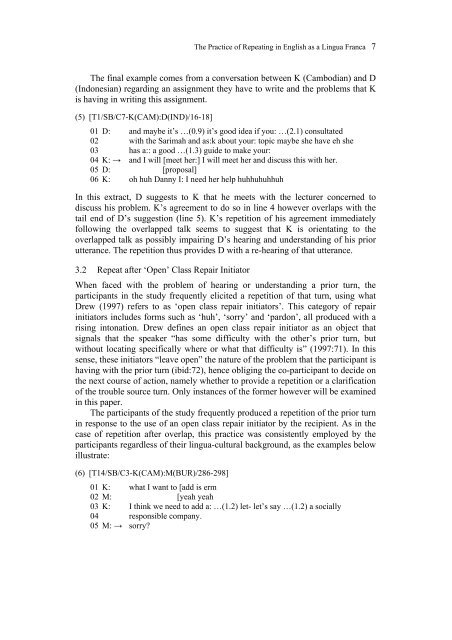Dialogue in and between Different Cultures - International ...
Dialogue in and between Different Cultures - International ...
Dialogue in and between Different Cultures - International ...
You also want an ePaper? Increase the reach of your titles
YUMPU automatically turns print PDFs into web optimized ePapers that Google loves.
The Practice of Repeat<strong>in</strong>g <strong>in</strong> English as a L<strong>in</strong>gua Franca 7<br />
The f<strong>in</strong>al example comes from a conversation <strong>between</strong> K (Cambodian) <strong>and</strong> D<br />
(Indonesian) regard<strong>in</strong>g an assignment they have to write <strong>and</strong> the problems that K<br />
is hav<strong>in</strong>g <strong>in</strong> writ<strong>in</strong>g this assignment.<br />
(5) [T1/SB/C7-K(CAM):D(IND)/16-18]<br />
01 D: <strong>and</strong> maybe it’s …(0.9) it’s good idea if you: …(2.1) consultated<br />
02 with the Sarimah <strong>and</strong> as:k about your: topic maybe she have eh she<br />
03 has a:: a good …(1.3) guide to make your:<br />
04 K: → <strong>and</strong> I will [meet her:] I will meet her <strong>and</strong> discuss this with her.<br />
05 D: [proposal]<br />
06 K: oh huh Danny I: I need her help huhhuhuhhuh<br />
In this extract, D suggests to K that he meets with the lecturer concerned to<br />
discuss his problem. K’s agreement to do so <strong>in</strong> l<strong>in</strong>e 4 however overlaps with the<br />
tail end of D’s suggestion (l<strong>in</strong>e 5). K’s repetition of his agreement immediately<br />
follow<strong>in</strong>g the overlapped talk seems to suggest that K is orientat<strong>in</strong>g to the<br />
overlapped talk as possibly impair<strong>in</strong>g D’s hear<strong>in</strong>g <strong>and</strong> underst<strong>and</strong><strong>in</strong>g of his prior<br />
utterance. The repetition thus provides D with a re-hear<strong>in</strong>g of that utterance.<br />
3.2 Repeat after ‘Open’ Class Repair Initiator<br />
When faced with the problem of hear<strong>in</strong>g or underst<strong>and</strong><strong>in</strong>g a prior turn, the<br />
participants <strong>in</strong> the study frequently elicited a repetition of that turn, us<strong>in</strong>g what<br />
Drew (1997) refers to as ‘open class repair <strong>in</strong>itiators’. This category of repair<br />
<strong>in</strong>itiators <strong>in</strong>cludes forms such as ‘huh’, ‘sorry’ <strong>and</strong> ‘pardon’, all produced with a<br />
ris<strong>in</strong>g <strong>in</strong>tonation. Drew def<strong>in</strong>es an open class repair <strong>in</strong>itiator as an object that<br />
signals that the speaker “has some difficulty with the other’s prior turn, but<br />
without locat<strong>in</strong>g specifically where or what that difficulty is” (1997:71). In this<br />
sense, these <strong>in</strong>itiators “leave open” the nature of the problem that the participant is<br />
hav<strong>in</strong>g with the prior turn (ibid:72), hence oblig<strong>in</strong>g the co-participant to decide on<br />
the next course of action, namely whether to provide a repetition or a clarification<br />
of the trouble source turn. Only <strong>in</strong>stances of the former however will be exam<strong>in</strong>ed<br />
<strong>in</strong> this paper.<br />
The participants of the study frequently produced a repetition of the prior turn<br />
<strong>in</strong> response to the use of an open class repair <strong>in</strong>itiator by the recipient. As <strong>in</strong> the<br />
case of repetition after overlap, this practice was consistently employed by the<br />
participants regardless of their l<strong>in</strong>gua-cultural background, as the examples below<br />
illustrate:<br />
(6) [T14/SB/C3-K(CAM):M(BUR)/286-298]<br />
01 K: what I want to [add is erm<br />
02 M: [yeah yeah<br />
03 K: I th<strong>in</strong>k we need to add a: …(1.2) let- let’s say …(1.2) a socially<br />
04 responsible company.<br />
05 M: → sorry?



